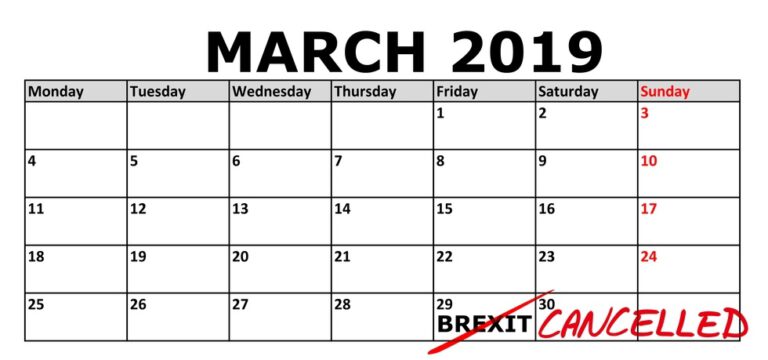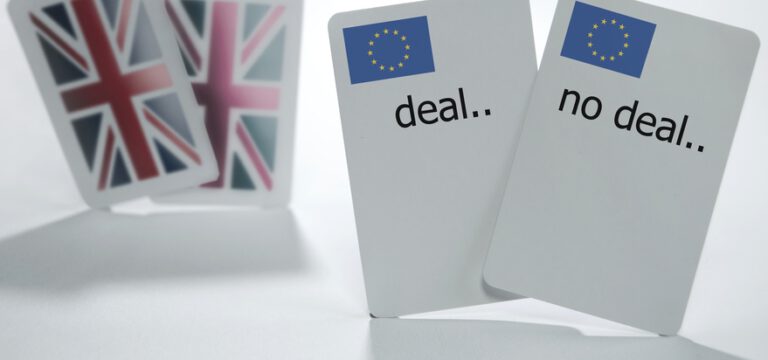Whatever the Conservative wise men and women of the British Government may have had in mind when – after more than two years of hard talks – it decided to renegotiate the Withdrawal Agreement it is evident that the EU cannot and will not reopen the backstop solution for Ireland and agree on a substantially new deal within two weeks. Quite apart from the fact that the EU will not move a corner stone of the Withdrawal Agreement, the time frame does not allow for any further substantial talks on this issue. An experienced Prime Minister should know that any change would in practice require the agreement of 27 EU Member States. And does Mrs. May not suffer a credibility problem when she argues in Parliament that it is “either this deal or no deal” and now goes back to Brussels seeking a substantial change?
This raises the question whether the Prime Minister fully well knows that she will come back from Brussels empty-handed and simply seeks to run down the clock in order to push her current draft Withdrawal Agreement through British Parliament. However, the crushing defeat on ‘her deal’ within her own Party should have convinced her that she would have to gamble with the same cards and expect to lose again. Undoubtedly, precious time will be lost.
So what are her motifs? Over the last few months it has become clear to any political mind that a no deal Brexit is the worst possible scenario for the British economy, the British and, above all, the Irish people. Indeed, the return of a hard border between Northern Ireland and the Republic Ireland would be an economic and political disaster for Ireland, too. The British Government bluntly gambles with the peace in Ireland and Tony Blair’s historical achievement. After decades of violence and conflicts in the sixties and seventies, the Good Friday Agreement, which was tacitly embedded in a European Union framework, put an end to centuries of animosity between the UK and Ireland. Thanks to party political meandering of the British Government, the Irish fear of violence is likely to come back if a hard border becomes daily reality. It is pointless to ask oneself, whether it is worth putting the Good Friday Agreement at risk for petty maneuvering within the Conservative Party. The ethical motifs as well as the political credibility of the British Government, which after all represents a highly regarded democracy, are at stake. Does Mrs. May seriously wish to play the Irish card and allow a hard border to emerge again, as if this was a Lego game?
The dangerous moment has come that not only Ireland but most other EU-Members no longer want the UK to be part of the European Union if it puts question marks on the highest goal: keeping the peace in Europe. The European political framework has served us well for seventy years. No government in Europe has the right to take the risk of resurging violence.
There is no doubt that, in case of a Brexit without a deal, there will be an instant economic and political price to be paid by Ireland, too. Sadly, it may be necessary for Ireland and the UK to suffer from long queues along the British borders, in line with a dramatic loss of jobs, and recurring violence between Ireland and the UK before the political elite comes to its senses. One should always bear in mind that learning the hard way will jeopardize the very existence of the UK and the European Union. Gambling has never been a wise political strategy. The British Government apparently thinks otherwise.
It is time for the British people to remember those Prime Ministers of the United Kingdom who were intelligent enough to seek political and economic ties with Europe, such as Mr. McMillan, Ted Heath, Margaret Thatcher, John Major and many others. They were fully aware that such move would never be perfect and perhaps the best of all evils. A club always has rules which some individual club members may not like. On the other hand, they knew that a club would provide protection, social and economic welfare, political stability and, above all, peace amongst club members in an ever more complex global environment. The United Kingdom has every reason to insist on changes within the European Union. But leaving it without a viable alternative concept is a naïve and politically dangerous journey. The dream of national sovereignty long vanished before the UK joined the European Union. The Empire has been largely reduced to occasional visits by the Monarch. The political ties of its members are loose and largely symbolic. The special ties to the United States are no safe haven any longer. The relations have become more and more unreliable the more the United States follow their own political agenda.
It is time for the United Kingdom to leave Ireland in peace and wake up to reality. It has become part of Europe and should peacefully work within the institutions. If the UK needs more time to self-reflect, the EU should readily grant it.







